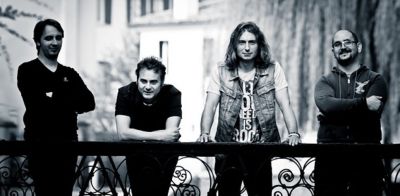Irish literary legend Oscar Wilde once asserted that “Imitation is the sincerest form of flattery that mediocrity can pay to greatness.” Unknown and aspiring musicians usually resign themselves to this approach launching their careers as “cover” artists. This option seems like the only logical choice at first as there are the proverbial dues to pay. They can be forgiven later, however, once notoriety and competency are achieved and an artist “breaks out” and pursues their own unique identity.
Adhering to this formula is the Italian rock band Quarto Profilo which was established in 1995 in the city of Treviso located in the northern region of Veneto. Founding members Giorgio Barbarotta (vocals), Edoardo Giommi (guitar), Michele Napolitano (bass), and Nicolò Scibilia (drums) spent their early years playing the local bar circuit and developing their sound while incorporating their own distinct styles. Their music was heavily influenced by 70’s British rock legends Rolling Stones, Deep Purple and Led Zeppelin. Their lyrics, on the other hand, paid homage to the great contemporary Italian music storytellers such as Francesco De Gregori, Fabrizio De André and Lucio Battisti. The message was simple and direct and often dealt with the injustices of society and the struggles of the human condition.
Quarto Profilo produced their own demo tape in 1996 and peddled it to record labels, radio stations, publicists, and to anyone who cared to listen. The positive response inspired them to return to the studio and complete their first full-length album “Voci” (1997). This polished, eight-song release included re-recordings of “Prendila così” and “A domani;” two songs from their earlier demo tape. Their efforts did not go unnoticed as they immediately received invitations from regional festivals and music competitions to perform live as the recording was considered both a critical and popular success.
The next two years were spent travelling throughout northern Italy as they hoped to establish a foothold within the crowded musical market. A limited edition mini-CD of new material entitled “Quarto Profilo 1998” was quickly produced and distributed exclusively for radio-only broadcast as a means to gain additional and valuable exposure. The next year would turn out to be pivotal as Michele and Nicolò, two of the original founding members, chose to leave the band due to personal and artistic differences.
Looking to restore the structure of the band, Giorgio and Edoardo auditioned noted jazz drummer Stefano “Cava” Fedato who would only join them on a temporary basis until the two finally welcomed Stefano Silenzi (guitar), Andrea De Marchi (drums) and Alberto Marenco (bass). This new lineup immediately clicked and soon they put the finishing touches on their third full-length recording “Ogni cosa che rimane” (2000). The 11 songs featured inspired songwriting and more complex arrangements with the addition of the new members. As the venues and crowds grew larger, Quarto Profilo received invitations to some of the more prestigious events, including the periphery Sanremo music exhibitions earning them praise as one of the best groups to come from the Veneto region.
The group was soon back in the studio for the release of their fourth album “Cento parole” (2002). This 13-song recording was their most ambitious to date and would yield their first professionally produced video single “Istintivamente.” The group’s growing popularity and demanding tour schedule would, however, lead to rising internal tensions and as a result, founding member and lead vocalist Giorgio Barbarotta along with guitarist Stefano Silenzi would leave the band in February of 2003 citing displeasure with the band’s direction.
Wishing not to lose any of the momentum they accumulated, the remaining members recruited Rudi Michelutti (guitar) and Giuseppe Pinarello (vocals) to restore the status quo and resume their ambitious touring schedule. Quarto Profilo returned from the road ready to begin work on their fifth album “Il cuore non lo sa” (2005). The recording displayed a decidedly softer feel as it included more acoustic-based ballads as evidenced by the songs “Che musica sarà,” “Un grido o una preghiera,” “Il cielo d’Oriente,” and “Nella mia parte.” A follow-up supporting tour allowed the recently re-formed group to coalesce and begin work on new compositions that would eventually see the light of day with the release of their sixth studio album “É tutta un’altra cosa” (2008). Quarto Profilo returned to their rock roots with this 10-song recording, produced from within as drummer Andrea De Marchi assumed the lead in the completion of the album. “La rotta” and “Apri le tue braccia” would become fan favorites and later a regular part of their live performances. Unfortunately, the band would see yet another departure as Rudi Michelutti would leave the band citing fatigue and indifference. The group decided to remain a quartet for the time being and chose to reduce their recording and touring schedule.
Five years would pass before they returned to the studio to release their seventh album “Niente domande” (2013) which was again produced by Andrea De Marchi and featured guitar contributions by renowned studio musician Carlo De Bei. “Vivere il tuo tempo” and “Soltanto di te” were the most requested songs from the recording. Their most recent album “Semplice” (2016) featured synthesizer, piano and string accompaniment, “Unplugged” (2018) revisited many of their best songs, re-recorded in an acoustic setting, and their latest, “Tra la polvere ed il sole” (2019), features the band at its creative apex. The release contained radio-friendly compositions and utilized social media platforms to reach a wider audience and, for the first time, create a global presence. For more information, visit www.quartoprofilo.com.



